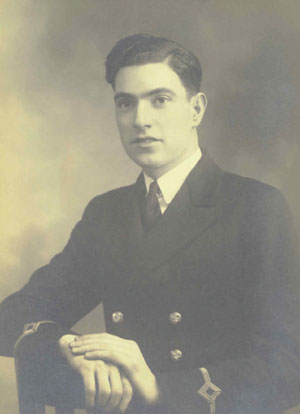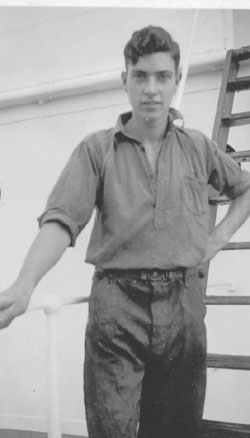|
/back
Deputy Assistant Commissioner
Peter Neivens OBE QPM
A tribute to Peter Neivens by Andrew
Neivens
 My
father was born on the 4th June, 1922, at St. Marylebone, London the only
son of Charles and Matilda Neivens. It wasn’t long before he was taking
his first sea voyage, as in 1924 he and his parents immigrated to Toronto,
Canada. My
father was born on the 4th June, 1922, at St. Marylebone, London the only
son of Charles and Matilda Neivens. It wasn’t long before he was taking
his first sea voyage, as in 1924 he and his parents immigrated to Toronto,
Canada.
The Toronto winters proved too harsh for my grandmother, so in 1928 the
family returned to England and settled on Canvey Island in the Essex. In
Canada, Peter would have started school when he was seven years of age. In
the UK, children started school at five years of age. So, Peter had to go
to school sooner than he was expecting. This was a difficult time for my
father as he was a year behind the other children and he had a
foreign-sounding North American accent. He was effectively a foreign
immigrant in his own country. In was this early experience that allowed my
father to see situations from an outsiders view and enabled him to
empathize with others in similar circumstances.
As a boy my father only has one idea in his mind, “to go to sea”. As his
14th birthday approached he saw an advertisement in the Scout magazine;
“Boys aged 14 to 17, wishing to pursue a career in the Mercantile Marine,
should apply to the following address for further information”. Peter sent
off for the information, submitted his application and in September 1936
reported to the Prince of Wales Sea Training Hostel Limehouse, 2, Church
Row, London E14. The training lasted six months and guaranteed a posting
to a reputable shipping company on successful completion of the course.
His parents, in particular his mother, didn’t share Peter’s enthusiasm for
going to sea and secretly hoped that time at sea as a deck boy would
change his mind. When Peter returned from his initial time at sea more
enthusiastic then ever about a career at sea, his father agreed for Peter
to attend the Sir John Cass Nautical School. Peter then joined British
Tanker Company as an apprentice in July 1938. Just over a year later war
broke out and immediately my father and his colleagues were in the front
line. Peter’s mother wanted her son out of harms way but his father new,
that despite the danger, Peter was doing what he has always wanted to do
and enjoyed the life at sea immensely.
 During
the war he was torpedoed in 1940 and spent 10 days in an open boat before
reaching safety in the Azores. In 1942 he was mined leaving Falmouth and
escaped with his life being the closest to the point of explosion below
decks in his bunk but being protected by the water tank below him. Another
strange incident occurred one night off the East Coast of America when he
was officer of the watch. He received instructions to make a 90 degree
turn as the ship’s cargo was urgently required at Malta. After the turn,
the ship hit something. Being concerned that he had hit another ship and
that there were men in the water, my father made to turn about and return
to the point of impact. The Captain came to the bridge and instructed my
father to steam at full speed ahead away from the point of impact. It
wasn’t until some 60 years later that my father learnt what he had hit
that night. When reading a book about the war at sea he learnt that he had
actually hit U-Boat 333 and damaged it so badly that if was forced to
return to port all the way across the Atlantic on the surface. Peter was
awarded the 1939-45 Star, the Atlantic Star, the Burma Star and the War
Medal, 1939-45. During
the war he was torpedoed in 1940 and spent 10 days in an open boat before
reaching safety in the Azores. In 1942 he was mined leaving Falmouth and
escaped with his life being the closest to the point of explosion below
decks in his bunk but being protected by the water tank below him. Another
strange incident occurred one night off the East Coast of America when he
was officer of the watch. He received instructions to make a 90 degree
turn as the ship’s cargo was urgently required at Malta. After the turn,
the ship hit something. Being concerned that he had hit another ship and
that there were men in the water, my father made to turn about and return
to the point of impact. The Captain came to the bridge and instructed my
father to steam at full speed ahead away from the point of impact. It
wasn’t until some 60 years later that my father learnt what he had hit
that night. When reading a book about the war at sea he learnt that he had
actually hit U-Boat 333 and damaged it so badly that if was forced to
return to port all the way across the Atlantic on the surface. Peter was
awarded the 1939-45 Star, the Atlantic Star, the Burma Star and the War
Medal, 1939-45.
We all know what a charming and excellent communicator my father was. He
was also very persistent and could even be stubborn, particularly when he
thought he was right and someone else was wrong. When he returned to
Abadan in 1946, after serving two years on the Indian coast, he was
expecting to be sent back to the UK. Instead he was told to go to
Australia, so he put in his papers and returned to the UK.
After a short but important time working in an office (he met my mother)
he joined the Metropolitan Police in November 1947. In January 1948 my
mother and father married at Gidea Park. After two years at Southwark he
was transferred to Thames Division and was then promoted Sergeant at
Plaistow in 1953; the year in which I was born. He was promoted Inspector
at Woolwich in 1959, Chief Inspector at Plaistow in 1964 and
Superintendent at Holborn in 1966. Throughout this successful career he
still found time to run a Sea Cadet Unit on the Isle of Dogs as well as
being involved with other voluntary organizations. Peter was initiated
into Freemasonry in 1957 and had a distinguished Masonic career becoming
Deputy to the Provincial Grand Master of Essex in 1995.
In 1968 he joined the newly created Community Relations Branch and was
responsible for setting up the successful Juvenile Bureau Scheme. To do
this he used his many talents to work with the Home Office, Magistrates,
Social Workers, and Probation Officers etc.
He was promoted Commander in 1970 and took charge of K Division which
covered East Ham to Romford. In 1975 he was awarded the QPM. In 1976 he
was promoted Deputy Assistant Commissioner, first in charge of No. 2 Area
and then in 1977 as Director of the Complaints and Investigation
Department (“police of police”).
In January 1978, the Evening News ran the headlines “Yard gets new voice”
when my father was appointed Director of Information. As Director of
Information he was responsible for liaising with the press and TV during
the Iranian Embassy Siege in 1980. In the New Years Honours of 1982 he was
awarded the OBE. He retired from the police in January 1982.
After the police he went to work for Trident which had just acquired the
Play Boy Club. You can imagine the Headlines. “Mr. Clean joins Play Boy!”
My favourite and indeed my father’s favourite was an Evening Standard
cartoon showing an overweight policeman, badly disguised as a bunny girl,
approaching one of the gambling tables, flexing his knees and saying
“Evening all!”. My father had a good sense of humour and enjoyed the joke
with everyone else. My father enjoyed his role of Compliance Officer at
Trident and particularly enjoyed working for Lord Hanson.
After Trident he continued to work for various voluntary organisations. He
also continued to pursue his passion for travelling. Like father, like son
I have also travelled throughout my career and my father came to visit me
in Holland and Switzerland.
In 1997, as my wife and I prepared to move to Mexico, he bought his first
personal computer at the age of 75 to communicate by email with us in
Mexico. This didn’t stop him visiting us as well! On another visit to
Switzerland after my wife and I returned from Mexico he teamed up with a
Norwegian student and swapped emails and digital photos like the best of
them. I always use my father as an example that age is no barrier to
learning new technologies.
My father was a caring individual, someone always positive and focussed in
achieving his goals. He was an excellent communicator and mixed easily
with all types of people. He was level-headed in times of crisis and was
an engaging individual who always got the best from others.
Peter passed away on 31st August 2006 having first suffered a stroke in
November 2004. He finally returned to the sea when his ashes were taken
out by the Walton and Frinton lifeboat and scattered at sea.
|